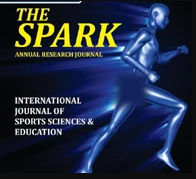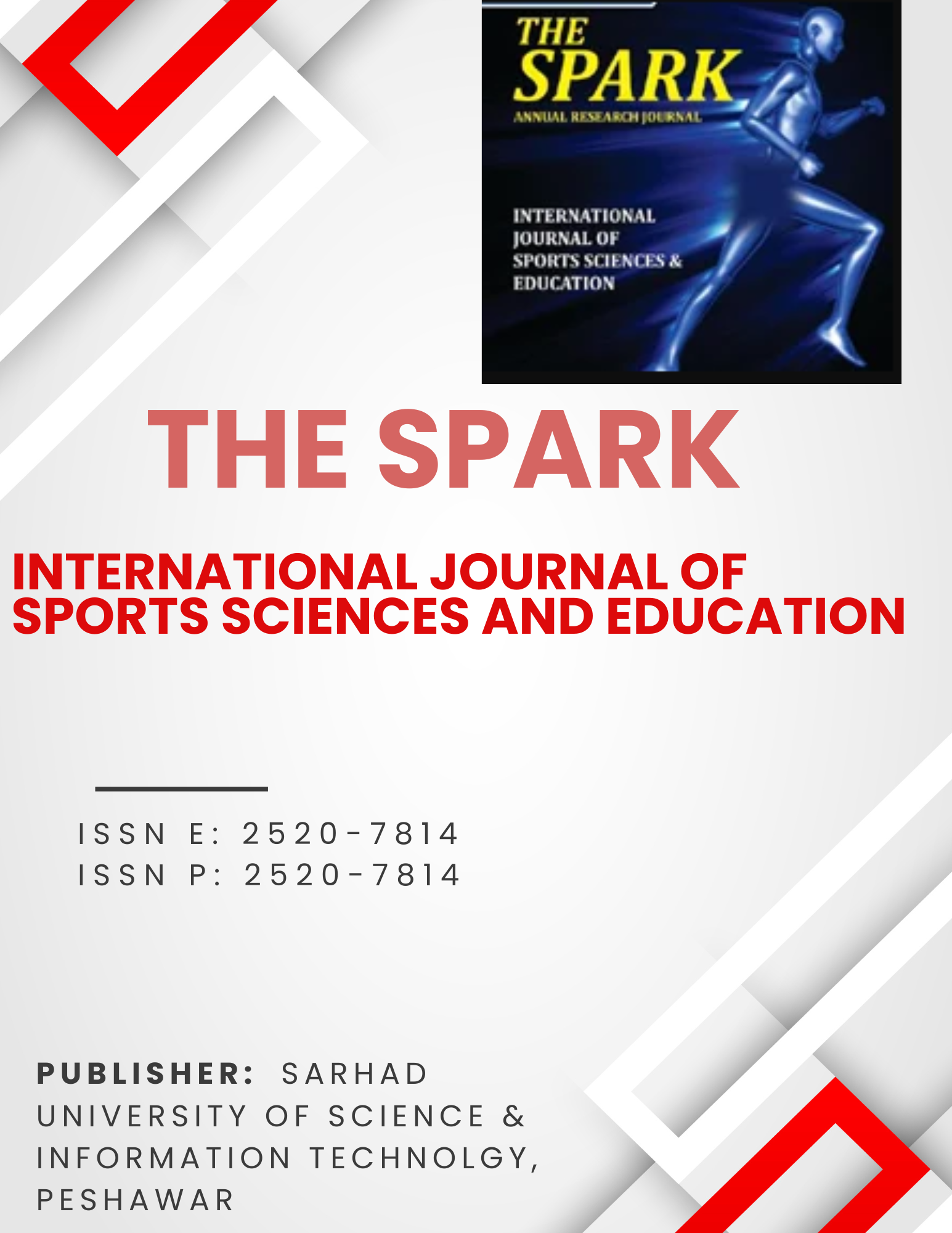RELATIONSHIP BETWEEN LIFE SKILLS AND ACADEMIC ACHIEVEMENTS AMONG HEALTH AND PHYSICAL EDUCATION STUDENTS
Keywords:
Exploring, Life Skills, Academic Achievement, University, Student-athletesAbstract
Purpose: The present study was subjected to determine the relationship of life skills with academic achievements among health and physical education students at the university level of Khyber Pakhtunkhwa, Pakistan. Methods: The research sample consisted n=335 (265 (79.1%) males and 70 (20.9%) females from the discipline of health and physical education. In this regard, stratified random sampling was applied. A survey research design from s descriptive model was used. A self-made closed-ended questionnaire was properly developed and used for the collection of the required information. The collected data were evaluated using both descriptive and inferential statistical tests. Results: Results indicated that the overall level of academic achievement and the various life skills of participants are desirable. The findings also showed that life skills (decision-making skills, interpersonal communication skills, and identity development skills) have an important connection with academic achievement as well as having the required predictive capacity for determining the criterion variable of academic achievement. Conclusion: The results supported the hypotheses as the student from the university consider life skills development an important tool for the improvement of academic achievement of student.
References
Arif, T., Khan, W., Shaikh, S., & Saba, M. (2020). Assessment of life skills among college undergraduate-students; implication for enhancing students’ academics and personality development. THE SPARK A HEC Recognized Journal, 5(1), 59-70.
Northouse, P. G. (2010). Authentic leadership. Leadership theory and practice (5th ed., pp. 205-239). Los Angeles, CA: Sage.
Botvin, G. J., Griffin, K. W., Paul, E., & Macaulay, A. P. (2003). Preventing tobacco and alcohol use among elementary school students through life skills training. Journal of Child & Adolescent Substance Abuse, 12(4), 1-17.
Cohen, J. (2006). Social, emotional, ethical, and academic education: Creating a climate for learning, participation in democracy, and well-being. Harvard educational review, 76(2), 201-237.
Danish, S. J., Petitpas, A. J., & Hale, B. D. (1993). Life development intervention for athletes: Life skills through sports. The counseling psychologist, 21(3), 352-385.
Elias, M. J., Zins, J. E., Graczyk, P. A., & Weissberg, R. P. (2003). Implementation, sustainability, and scaling up of social-emotional and academic innovations in public schools. School Psychology Review, 32(3), 303-319.
Gould, D., & Carson, S. (2008). Life skills development through sport: Current status and future directions. International review of sport and exercise psychology, 1(1), 58-78.
Karabacak, Ãœ., Serbest, Åž., Kan Öntürk, Z., Eti Aslan, F., & Olgun, N. (2013). Relationship between student nurses’ selfâ€efficacy and psychomotor skills competence. International Journal of Nursing Practice, 19(2), 124-130.
Langhinrichsen-Rohling, J., Friend, J., & Powell, A. (2009). Adolescent suicide, gender, and culture: A rate and risk factor analysis. Aggression and Violent Behavior, 14(5), 402-414.
Lemyre, F., Trudel, P., & Durand-Bush, N. (2007). How youth-sport coaches learn to coach. The sport psychologist, 21(2), 191-209.
Lerner, J. V., Phelps, E., Forman, Y. E., & Bowers, E. P. (2009). Positive youth development. Handbook of adolescent psychology, 1.
Parker, D. R., & Boutelle, K. (2009). Executive function coaching for college students with learning disabilities and ADHD: A new approach for fostering selfâ€determination. Learning Disabilities Research & Practice, 24(4), 204-215.
Payton, J. W., Wardlaw, D. M., Graczyk, P. A., Bloodworth, M. R., Tompsett, C. J., & Weissberg, R. P. (2000). Social and emotional learning: A framework for promoting mental health and reducing risk behavior in children and youth. Journal of school health, 70(5), 179-185.
Pierce, S., Gould, D., & Camiré, M. (2017). Definition and model of life skills transfer. International Review of Sport and Exercise Psychology, 10(1), 186-211.
Reynaert, D., Bouverne-de-Bie, M., & Vandevelde, S. (2009). A review of children’s rights literature since the adoption of the United Nations Convention on the Rights of the Child. Childhood, 16(4), 518-534.
Roose, R., & BOUVERNEâ€DE BIE, M. A. R. I. A. (2007). Do children have rights or do their rights have to be realised? The United Nations Convention on the Rights of the Child as a frame of reference for pedagogical action. Journal of Philosophy of Education, 41(3), 431-443.
Scent, C. L., & Boes, S. R. (2014). Acceptance and commitment training: A brief intervention to reduce procrastination among college students. Journal of College Student Psychotherapy, 28(2), 144-156.
Trilling, B., & Fadel, C. (2009). 21st century skills: Learning for life in our times. John Wiley & Sons.
Turner, E. A., Chandler, M., & Heffer, R. W. (2009). The influence of parenting styles, achievement motivation, and self-efficacy on academic performance in college students. Journal of college student development, 50(3), 337-346.
Wang, S., & Noe, R. A. (2010). Knowledge sharing: A review and directions for future research. Human resource management review, 20(2), 115-131.
Webster-Stratton, C., Reid, M. J., & Hammond, M. (2004). Treating children with early-onset conduct problems: Intervention outcomes for parent, child, and teacher training. Journal of clinical child and adolescent psychology, 33(1), 105-124.
Wolfe, D. A., Jaffe, P. G., & Crooks, C. V. (2008). Adolescent risk behaviors: Why teens experiment and strategies to keep them safe. Yale University Press.
World Health Organization, World Health Organization. Reproductive Health, World Health Organization. Department of Reproductive Health, UNICEF., & United Nations Fund for Population Activities. (2003). Pregnancy, childbirth, postpartum, and newborn care: a guide for essential practice. World Health Organization.
World Health Organization. (2003). Skills for health: skills-based health education including life skills: an important component of a child-friendly/health-promoting school.
Downloads
Published
How to Cite
Issue
Section
License
Submission of an original manuscript to the Journal will be taken to mean that it represents original work not previously published, that it is not being considered elsewhere for publication. And if accepted for publication, it will be published in print and online and it will not be published elsewhere.
The journal main policy reflects in its stance that the publication of scholarly research is exclusively meant to disseminate knowledge and not-for-purposes.








 Name of Journal:
Name of Journal: 